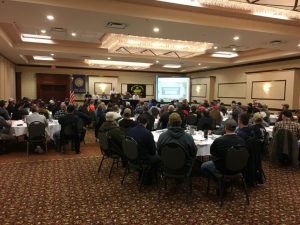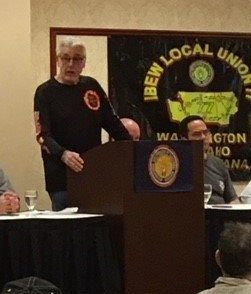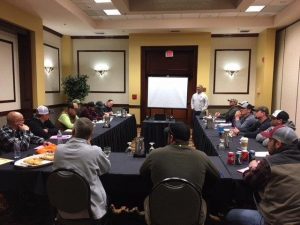On March 24, members of IBEW 1245’s the three Peer-to-Peer safety programs traveled to Spokane, Washington to participate in what is hoped to be the birth of a new peer safety program at IBEW Local 77. Hold the Pull Committee Chairmen Mike Van Egmond Keep the Clearance Chair Carlos Rodriguez and Control the Pressure Chair Ernie Pena, along with 1245 staff members Casey Kelley and Rich Lane, facilitated a set of breakout sessions and a panel discussion related to how to start and run a peer program.
Approximately 110 IBEW Local 77 members from various utilities and construction trades throughout the Inland Northwest gave up their Saturday to talk safety issues and hear from speakers who showed up in support of the new George Brooks Safety Initiative. The program is named for George Brooks, a local electrical line visionary and safety advocate who proposed and attempted to enact Washington State’s first electrical safety orders in the early 1900s. In reaction to his efforts, he was terminated as a lineman at Seattle City Light and blackballed from working in the state. However, Brother Brooks later went on to experience great success and patent what every climbing lineman knows as Brooks Hooks.
The day’s events were emceed by IBEW 77 Executive Board member Rick Luiten and Assistant Business Manager Mike Brown. They introduced the various speakers who spoke directly about the need to stay vigilant about safety within the various crafts represented.
“IBEW was founded principally on safety,” Local 77 Business Manager Lou Walters shared.
“We have an obligation to ourselves and future generations to keep faith with that foundation.”
Tim Ormsby, a member of the Washington State House of Representatives and a proud card-carrying bricklayer’s union member, recalled how the union made possible the financial security for his family, both as a child and as an adult. That security eventually lead Ormsby to college and the House of Representatives. Ormsby stated that none of that would have been possible if his father did not work safe.
An impactful personal experience of a high voltage contact was shared by Inland Power Lineman and self-described cowboy Ed Bageant.
“Look at me. My whole life I’ve been a cowboy — from the boots and hat to my work attitude — and that’s how I got myself between a ground and a primary phase and almost killed myself,” said Bageant, “When you get that close to death, it changes you, and it changed me. I think I survived for a purpose.”
Perhaps the most poignant story was an old one shared by Brady Hansen, Avista trainer and the founder of the Suriname American Brotherhood Initiative (SABI). Hansen shared the biblical story of Caine and Abel and tied the story into the term “Brother’s Keeper.” According to the passage, after Caine slew Abel, God asked Caine where his brother was, and Caine stated he was not his brother’s keeper.
“As union members, we are all our brothers’ and sisters’ keepers,” said Hansen. “We use that term to remind us of our responsibility to each other and how much we need each other to stay safe.”
After lunch, the Local 1245 peer group gave a presentation explaining the history of the 1245 program, some of its challenges, and how it shapes up today. Business Representatives Rich Lane and Casey Kelley were honest in what they felt worked and didn’t work and the challenges and successes that can be experienced. Two sets of slides were shown to the group displaying the names of the 30 members of Local 1245 who died on the job between 2003 and 2017.
“You may look at these slides and say the program is not very successful,” said Lane. “However, I look at it, and it tells me the work never ends. We can’t surrender the battle to end fatalities.”
Casey Kelley spoke to the way the members have become more mature in their attitude toward safety, not accepting pressure to put production over their well-being,
“That has happened throughout this program. The mutual support is not possible in any other way,” said Kelley. “It’s much deeper than a company safety program. Members controlling their own decision-making has a power that can’t be matched.”
IBEW Local 1547 Business Representative Julius Mathews spoke in support of the Local 77 effort, pointing out that in Alaska many safety issues involve risky decision-making by the membership that has resulted in serious consequences, but guidance by a peer can make the difference. Local 1547 was the second union-based peer program created after the Local 1245 model, but Mathews pointed out that 1547 members have “made their own model,” reflecting the unique safety needs of the membership in populated and remote areas throughout the state of Alaska.
Toward the end of the day, the Local 1245 peer group moved into four break-out sessions comprised of electrical line, gas, trees and generation groups. Each group discussed a set of questions created by the Local 1245 peer members to identify safety problem areas and polled the participants for interest in serving with the George Brooks peer initiative as either committee members or safety stewards. All of the information was gathered after the 1 ½ hour breakout and delivered to Brooks program members as the group re-assembled in the main hall to participate in a panel discussion with the Local 1245 members.
 The panel fielded questions from the crowd that ranged from how to grow a program, gather interest and increase participation, as well as some of the pitfalls they’ve experienced. Finally, Local 77 President Rick Johnson stood up and thanked the group for turning out in such great numbers and wanted a show of hands in support of a George Brooks Safety Initiative. The response was overwhelmingly in favor, and the George Brooks Safety Initiative was endorsed.
The panel fielded questions from the crowd that ranged from how to grow a program, gather interest and increase participation, as well as some of the pitfalls they’ve experienced. Finally, Local 77 President Rick Johnson stood up and thanked the group for turning out in such great numbers and wanted a show of hands in support of a George Brooks Safety Initiative. The response was overwhelmingly in favor, and the George Brooks Safety Initiative was endorsed.
–Rich Lane, IBEW 1245 Business Representative


